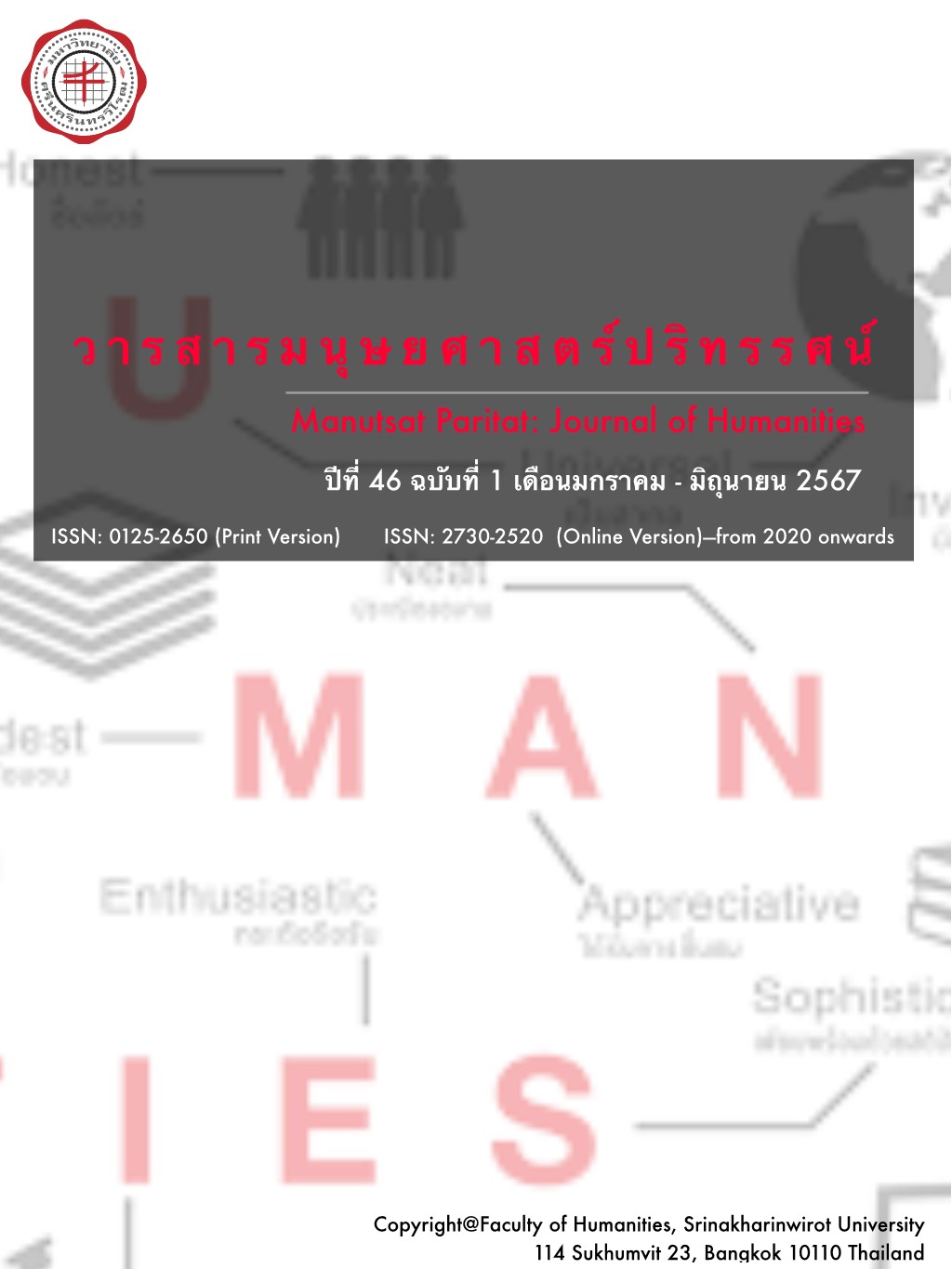Unordnung und frühes Leid and the Transition of Thomas Mann’s Political Viewpoints
Main Article Content
Abstract
This article examines the short literary work Unordnung und frühes Leid (1926) by German noble Prize laureate Thomas Mann. The study shows that this work not only documents German everyday life affected by the inflation crisis at the beginning of the 1920s and informs the readers about the culture of “the new generation” in the Weimar Republic (1919-1933), but also reflects Thomas Mann’s change of political viewpoints from his support of the monarchy to a belief in democracy. This change is revealed through character development of the protagonist and the positive representation of “the new generation”.
Article Details

This work is licensed under a Creative Commons Attribution-NonCommercial-NoDerivatives 4.0 International License.
Any unauthorized copying, publication, reproduction or distribution of copyrighted works appeared in Manutsat Paritat: Journal of Humanities is an infringement of the copyright owners’ rights. To authorize the copying, publication, reproduction or distribution of copyrighted works to be appeared in other printed materials or any online media, please write to MPJHthaijo@gmail.com for permission.
References
อารตี แก้วสัมฤทธิ์. (2565). นวนิยายขนาดสั้นของโธมัส มันน์. โครงการเผยแพร่ผลงานวิชาการคณะอักษรศาสตร์ จุฬาลงกรณ์มหาวิทยาลัย.
Bandur, M. S. (1990). Schlager. In H. H. Eggebrecht & A. Riethmüller (Eds.), Handwörterbuch der musikalischen Terminologie. Bd. 5 (pp. 1-12), Stuttgart. https://daten.digitale-sammlungen. de/~db/0007/bsb00070513/images/ index.html?fip= 193.174.98.30 &seite=499& pdfseitex=.
Banuls, A. (2005). Leben und persönlichkeit. In H. Koopmann (ed.), Thomas Mann handbuch (pp. 1-17). Fischer.
Bollenbeck, G. (1999). Tradition, avantgarde, reaktion. Deutsche kontroversen um die kulturelle moderne 1880-1945. Fischer.
Britannica, T. Editors of Encyclopaedia. (2023, September 4). Reformation. In Encyclopedia Britannica. https://www.britannica.com/event/Reformation.
Gilbert, A. (2023, September 13). Battle of Valmy. In Encyclopedia Britannica. https://www.britannica.com /event/Battle-of-Valmy.
Hermand, J., & Trommler, F. (1988). Die kultur der Weimarer republik. Fischer.
Hoffmeister, W. (1990). Thomas Manns „Unordnung und frühes Leid“: Neue Gesellschaft, neue Geselligkeit. Monatshefte, 82, 157-176.
Kolb, E. (2000). Die Weimarer republik (5th ed.). Oldenbourg.
Kurzke, H. (1991). Thomas Mann. Epoche-Werk-Wirkung (2nd ed.). Beck.
Mann, T. (1960). Betrachtungen eines unpolitischen. Fischer.
Mann, T. (2021). Späte Erzählungen 1919-1953. Hg. u. textkritisch durchsegehen v. H. R. Vaget unter Mitarbeit v. A. Immoos. Fischer.
Nordalm, J. (2001). Thomas Manns „Unordnung und frühes Leid“. Erich Marcks und Philipp II. von Spanien. TMJb, 14, 225-232.
Rehm, S. (2015). Von deutscher republik (1922). In A. Blödorn & F. Marx (Eds.), Thomas Mann handbuch. Leben-Werk-Wirkung (pp.162-164). Metzler.
Rijk, R. P.G. de, &. Michelena, L. (2023, September 23). Basque language. In Encyclopedia Britannica. https://www.britannica.com/topic/Basque-language.
Sandberger, W. (2010). Zur Bedeutung der medial vermittelten Musik in der Erzählung „Unordnung und frühes Leid“ von Thomas Mann. TMJb, 23, 9-26.
Stammen, T. (2005). Thomas Mann und die politische Welt. In H. Koopmann (ed.), Thomas Mann handbuch (pp. 18-53). Fischer.
Turner, D. (1999). Balancing the account. German Life & Letters, 52, No. 1, 43-57.
Vaget, H. R. (2005). Unordnung und frühes Leid. In H. Koopmann (ed.), Thomas Mann handbuch (pp. 594-596). Fischer.
Vaget, H. R. (2021). Thomas Mann. Späte Erzählungen 1919-1953. Kommentar. Fischer.
Widdig, B. (2001). Culture and inflation in Weimar Germany. University of California Press.


